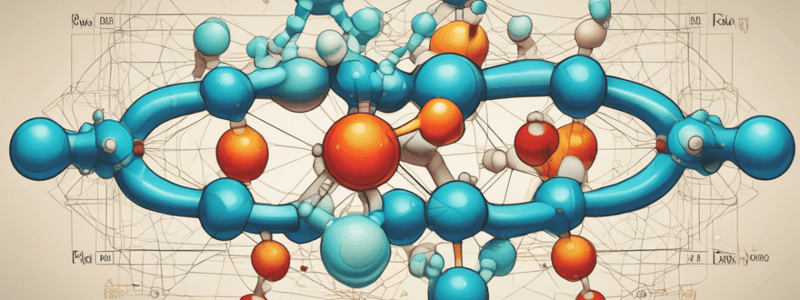Podcast
Questions and Answers
What is the primary goal of atoms during bonding according to the Octet Rule?
What is the primary goal of atoms during bonding according to the Octet Rule?
- To attain a neutral charge
- To reach an electronic arrangement with eight electrons in their outermost energy level (correct)
- To form a maximum number of bonds with other atoms
- To gain or lose one electron
What is the characteristic of ionic compounds in terms of their physical state at room temperature?
What is the characteristic of ionic compounds in terms of their physical state at room temperature?
- They are mostly solids at room temperature (correct)
- They are mostly liquids or gases
- They are mostly gases with high boiling points
- They are mostly solids with low melting points
What is the reason why covalent substances do not conduct electricity when molten or in solution?
What is the reason why covalent substances do not conduct electricity when molten or in solution?
- They do not break up to form ions (correct)
- They do not have a sufficient number of electrons
- They do not form ions
- They do not have a sufficient number of protons
What type of bond is formed by the end-on overlap of orbitals?
What type of bond is formed by the end-on overlap of orbitals?
What is the term for electrons that are shared in a covalent bond?
What is the term for electrons that are shared in a covalent bond?
What is the characteristic of covalent compounds in terms of their melting and boiling points?
What is the characteristic of covalent compounds in terms of their melting and boiling points?
What is the term for a bond where electrons are unequally shared between two atoms?
What is the term for a bond where electrons are unequally shared between two atoms?
What is the term for atoms that have gained or lost electrons to form ions?
What is the term for atoms that have gained or lost electrons to form ions?
What is the primary difference between the outermost energy level of an atom in an ionic bond and an atom in a covalent bond?
What is the primary difference between the outermost energy level of an atom in an ionic bond and an atom in a covalent bond?
Which type of bond is responsible for the high melting and boiling points of ionic compounds?
Which type of bond is responsible for the high melting and boiling points of ionic compounds?
What is the reason why ionic compounds tend to dissolve readily in water?
What is the reason why ionic compounds tend to dissolve readily in water?
What is the term for the number of bonds an atom of an element forms when it reacts?
What is the term for the number of bonds an atom of an element forms when it reacts?
What is electronegativity ?
What is electronegativity ?




